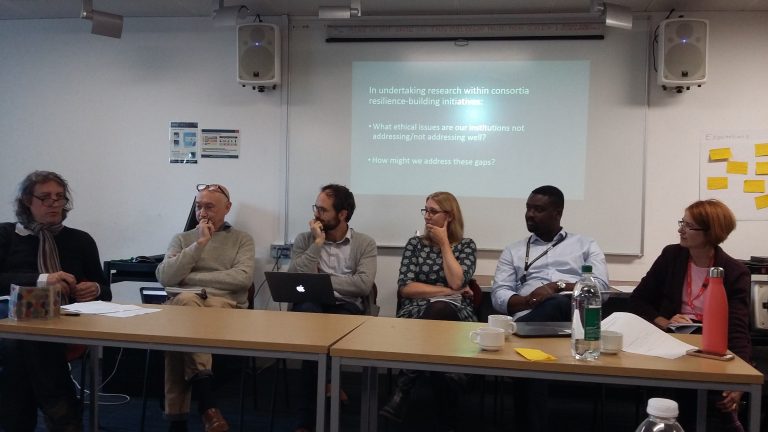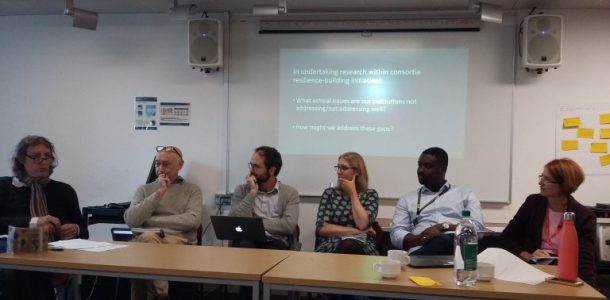By Matt Kandel, University of Southampton
On 26 September 2018 BRECcIA Researcher and Resilience Theme member, Matt Kandel, attended the workshop, ‘Ethics of co-production: the role of research in resilience-building’ at Kings College London (KCL). The KCL workshop, which was co-chaired by Emma Visman (KCL Senior Researcher/independent consultant) and Mark Pelling (Professor of Geography and GCRF Challenge Leader, Resilience to Environmental Shocks and Change Portfolio), carried particular salience for BRECcIA given its overlap with some of our project’s key themes: principally, the co-design and co-production of research, and resilience-building within the context of climate change.

The first several sessions of the workshop consisted of presentations by a wide range of researchers on the ethical and practical challenges to conducting consortia research. This included a presentation on the use of Theatre Forum in Senegal, a particularly dynamic and creative way to communicate the ethical complexities of collaborative research through the much more accessible medium of performing arts. The Montpellier-based team of presenters, which was comprised of two geneticists, Dr Adeline Barnaud (L’Institut de recherche pour le développement, IRD) and Dr Cecile Berthouly (IRD/ Institut Sénégalais de Recherches Agricoles, ISRA), an environmental scientist, Dr Francois Bousquet (Centre de coopération internationale en recherche agronomique pour le développement, CIRAD), and a social anthropologist, Dr Frédérique Jankowski (CIRAD), discussed how Theatre Forum allows for researchers and stakeholders to work through the tensions that arise when doing collaborative research on complex issues.
This was then followed by the session, ‘Considering local and “external” scientific knowledge about the weather and climate in Burkina Faso’, which was based on research carried out within the BRACED consortium by KCL researchers, Dr Camilla Audia and Frances Crowley. They argued that greater care needs to be taken to ensure that science-based climate information is rolled out in ways that are sensitive to indigenous knowledge and practices.
After this session came Dr Sophie Blackburn’s (KCL) presentation on the ethics of research dissemination. Based on her experience of disseminating research findings to communities in a post-disaster area of the Andaman Islands (where she conducted her PhD research), she raised the question of whether participatory activities put excessive burden on people’s time; stated differently, do local people actually derive substantive benefits from these sorts of exercises? Or, is this just another way for a researcher to tick-the-box, so to speak, as proof that they are engaging communities?
At this point we were then split into small working groups and asked to consider two questions pertaining to resilience-building research in large consortia: 1) Which ethical issues are institutes not addressing? 2) How might we address these gaps? Several of the ethical issues raised were how do we make sure that research (and the potential outputs) are relevant to the communities we engage? And, whose ethics are we following in a consortium—in other words, how can we reconcile the different values and ethical standards/expectations of different organisations in multi-country research consortia?
One of the proposed solutions to these gaps was to create more space for reflexivity within the proposal stages of a project. Given the move towards more consortia-funded research in the UK, some also expressed hope that funders would find ways to incentivize relationship-building prior to the proposal writing stage. The reason for this is that it would allow for more durable and equitable partnerships to develop prior to the research.
The workshop’s closing session brought together a diverse group of panelists whose backgrounds spanned academia, international development, knowledge management, and a research council. Dr Jean-Pierre Roux (Future Climate for Africa [FCFA]) noted it is still far too common for co-production to exist only in writing rather than practice. He recommended more fit-for-purpose bidding and procurement designs that incentivize collaboration so that we finally do away with the ‘extractive’ research model. Building on this point, Mark Pelling discussed his experiences in developing relationship spaces in partner countries, noting how this may lead to new collaborative opportunities down the road.
The emphasis placed on building and sustaining collaborative research partnerships speaks to a core objective of BRECcIA. With partners and stakeholders in Kenya, Ghana, Malawi, and the UK, BRECcIA is well-positioned to develop and nurture the sorts of collaborative networks that not only will generate impact but also be self-sustaining in the long-term. Maintaining a keen eye on the needs of local communities—the focus of our stakeholder mapping which is currently under way—will also be critical. As BRECcIA move forwards, it will be important to reflect on some of the key lessons from the KCL workshop.
This entry was posted in Conference and tagged co-production, meeting, Resilience on 28th September 2018.

